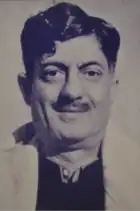Tushar Kanti Ghosh
Tushar Kanti Ghosh (September 21, 1898 - August 29, 1994) was an Indian journalist and author. For sixty years, until shortly before his death, Ghosh was the editor of the English-language Amrita Bazar Patrika newspaper in Kolkata.[1] He also served as the leader of prominent journalism organizations such as the International Press Institute and the Commonwealth Press Union.[1] Ghosh was known as the "grand old man of Indian journalism"[2] and "the dean of Indian journalism" for his contributions to the country's free press.[1]
Tushar Kanti Ghosh | |
|---|---|
 | |
| Born | September 21, 1898 Calcutta, British India |
| Died | August 29, 1994 (aged 96) Kolkata, West Bengal, India |
| Occupation | Journalist, novelist, children's author |
| Nationality | Indian |
| Alma mater | Bangabasi College |
| Children | 2 |
Ghosh studied at the Bangabasi College of the University of Calcutta.[3] He replaced his father as editor of the Amrita Bazar Patrika and founded sister newspapers across India, as well as a Bengali-language paper called Jugantar.[4]
Ghosh rose to prominence as a journalist in the Indian independence movement. He was a supporter of Mahatma Gandhi and the non-violence movement. British colonial authorities imprisoned Ghosh in 1935 for an article which attacked the authority of British judges.[5]
According to a possibly apocryphal story, the colonial Governor of Bengal Province once informed Ghosh that while he read his paper regularly, its grammar was imperfect and "it does some violence to the English language." Ghosh reportedly replied, "That, Your Excellency, is my contribution to the freedom struggle."[6]
In addition to his work as a journalist, Ghosh wrote fictional novels and children's books.[5] In 1964, he was a recipient of the third-highest civilian honour of India, the Padma Bhushan, for his contributions to literature and education.[7] Ghosh died of heart failure in Kolkata in 1994 after a brief illness.[8]
References
- The Baltimore Sun. "Tushar Kanti Ghosh, 96, a newspaper baron..." baltimoresun.com. Archived from the original on 15 October 2019. Retrieved 16 October 2019.
- Wolpert, Stanley A. (1 January 1962). Tilak and Gokhale: Revolution and Reform in the Making of Modern India. University of California Press. p. 359.
- "The Story of the Bangabasi College". Archived from the original on 12 June 2013. Retrieved 7 June 2013.
- "Without the Raj: State Control and the English-Language Press in India" (PDF). Shodhganga (শোধগাঙ্গা). pp. 237–324.
- "Tushar Kanti Ghosh, Independence Crusader, Dies at 96". AP NEWS. Archived from the original on 15 October 2019. Retrieved 16 October 2019.
- Ghose, Bhaskar (2006). "Communicating in English". frontline.thehindu.com. Retrieved 16 October 2019.
- "Padma Awards" (PDF). Ministry of Home Affairs, Government of India. 2015. Archived (PDF) from the original on 15 November 2014. Retrieved 21 July 2015.
- Reuters (30 August 1994). "Tushar Kanti Ghosh, Indian Journalist, 95". The New York Times. ISSN 0362-4331. Archived from the original on 15 October 2019. Retrieved 16 October 2019.